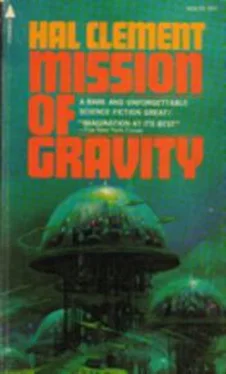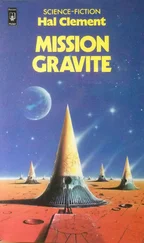Hal Clement - Mission of Gravity
Здесь есть возможность читать онлайн «Hal Clement - Mission of Gravity» весь текст электронной книги совершенно бесплатно (целиком полную версию без сокращений). В некоторых случаях можно слушать аудио, скачать через торрент в формате fb2 и присутствует краткое содержание. Жанр: Фантастика и фэнтези, на английском языке. Описание произведения, (предисловие) а так же отзывы посетителей доступны на портале библиотеки ЛибКат.
- Название:Mission of Gravity
- Автор:
- Жанр:
- Год:неизвестен
- ISBN:нет данных
- Рейтинг книги:4 / 5. Голосов: 1
-
Избранное:Добавить в избранное
- Отзывы:
-
Ваша оценка:
- 80
- 1
- 2
- 3
- 4
- 5
Mission of Gravity: краткое содержание, описание и аннотация
Предлагаем к чтению аннотацию, описание, краткое содержание или предисловие (зависит от того, что написал сам автор книги «Mission of Gravity»). Если вы не нашли необходимую информацию о книге — напишите в комментариях, мы постараемся отыскать её.
Mission of Gravity — читать онлайн бесплатно полную книгу (весь текст) целиком
Ниже представлен текст книги, разбитый по страницам. Система сохранения места последней прочитанной страницы, позволяет с удобством читать онлайн бесплатно книгу «Mission of Gravity», без необходимости каждый раз заново искать на чём Вы остановились. Поставьте закладку, и сможете в любой момент перейти на страницу, на которой закончили чтение.
Интервал:
Закладка:
„Unless it drifted in to fill it completely. Well, I’ll worry about that if and when it happens. All aboard!” He entered the tank, sealed the door, pumped out the Mesklinite atmosphere, and released the Earthly air that had been compressed into tanks before opening the door earlier. The small tank that held the algae whose job was to keep the air fresh glimmered as the circulators began driving bubbles through it. A tiny spectrometric „sniffer” reported the hydrogen content of ‘the air to be negligible; once assured of this, Lackland started his main motors without further hesitation, and headed the tank and its unwieldy trailer into the east.
The near flatness of the country around the cove changed gradually. In the forty days or so before Lackland had to stop for sleep, they had covered some fifty miles, and were in an area of rolling hills which reached heights of three or four hundred feet. No trouble had been encountered, either in pulling the sledge or in riding it. Barlennan reported on his radio that the crew were enjoying the experience, and that the unusual idleness had not bothered anyone yet. The speed of the tank and its tow was about five miles an hour, which was a good deal faster than the usual Mesklinite crawl; but in the negligible — to them — gravity, some of the crew were going overside and experimenting with other methods of travel. None had actually jumped as yet, but it looked as though Barlennan might have companions before long who shared his newly acquired indifference to falls.
No animal life had been seen so far, but there had been occasional tiny tracks in the snow which apparently belonged to creatures similar to those the Breeds crew had hunted for food during the winter. The plant We was distinctly different; in some places the snow was almost hidden by grasslike vegetation that had grown up through it, and on one occasion the crew was held spellbound at the sight of a growth which to Lackland resembled a rather stumpy tree. The Mesklinites had never seen anything grow so far from the ground.
While Lackland slept as comfortably as he could in his cramped quarters, the crew spread out over the surrounding country. They were at least partly motivated by a desire for fresh food, but salable cargo was the goal that really moved them. All were familiar with a wide variety of the plants which produced what Lackland had called spices, but none of these grew anywhere in the neighborhood. There were numerous growths bearing seeds, and nearly all had leaflike appendages of one sort or another and roots; the trouble was that there seemed no way of telling whether these were even safe to eat, to say nothing of being palatable. None of Barlennan’s sailors was rash or naiive enough to take even a taste of a plant he had never seen; too much of Mesklin’s vegetable life protected itself with fearsome efficiency with poisons. The usual means of testing in such cases involved trusting to the senses of any of several small animals commonly used by the Mesklinites — as pets; what a parsk or a temee would eat was safe. Unfortunately, the only such animal aboard the Bree had not survived the winter — or rather, the equator; it had blown away in the advance gust of one of the winter storms when its owner failed to lash it down in time.
The sailors did, indeed, bring numerous hopeful-looking specimens back to the ship; but none of them could offer a practical suggestion as to what to do with his find. Dondragmer alone made what might be termed a successful trip; more imaginative than his fellows, he had thought to look under objects, and had indeed turned over a great many stones. He had been a little uneasy at first, but his nervousness had finally worn off completely; and a genuine enthusiasm for the new sport had possessed him. There were lots of things to be found under even quite heavy stones, he discovered; and he presently returned to the ship carrying a number of objects which everyone agreed must be eggs. Karondrasee took them is charge — no one was afraid of eating any sort of animal food — and presently the opinion was confirmed. They were eggs — very good, too. Only after they had been consumed did anyone think of hatching some of them to learn what sort of animal they might belong to; and with that thought voiced, Dondragmer carried it a step further by suggesting that perhaps they might hatch an animal which could serve in the place of the missing temee. This idea was enthusiastically accepted, and parties sallied forth once more to look for eggs. The Bree had become practically an incubator by the time Lackland woke up.
Making sure that all the Bree’s crew had returned aboard, he restarted the tank and resumed the eastward journey. The hills grew higher in the next few days, and twice they crossed streams of methane, fortunately so narrow that the sled could actually bridge them. It was well that the rise in the hills was gradual, for there was a little uneasiness among the sailors whenever they had to look down any distance; but that, Barlennan reported, was gradually decreasing.
And then, some twenty days after the start of the second lap of the journey, their minds were taken completely off the terrors of height by something which seized and froze the attention of every living being on both vehicles.
VII: STONE DEFENSE
Up to this time, most of the hills had been gentle, smooth slopes, their irregularities long since worn off by weather. There had been no sign of the holes and crevasses which Lackland somewhat feared before starting. The hilltops had been smoothly rounded, so that even had their speed been much higher the crossing of one would hardly have been noticed. Now, however, as they topped such an acclivity and the landscape ahead came into view a difference in the next hill caught every eye at once.
It was longer than most they had crossed, more a ridge across their path than a mound; but the great difference was in the top. Instead of the smooth, wind-worn curve presented by its fellows, it seemed at first glance actually jagged; a closer look showed that it was crowned with a row of boulders spaced with regularity that could only mean intelligent arrangement. The rocks ranged from monstrous things as big as Lackland’s tank down to fragments of basketball size; and all, while rough in detail, were generally spherical in shape. Lackland brought his vehicle to an instant halt and seized his glasses — he was in partial armor, but was not wearing the helmet. Barlennan, forgetting the presence of his crew, made a leap over the twenty yards separating the Bree from the tank and settled firmly on top of the latter. A radio had been fastened there for his convenience long before, and he was talking almost before he had landed.
„What is it, Charles? Is that a city, such as you were telling me about on your own world? It doesn’t look very much like your pictures.”
„I was hoping you could tell me,” was the answer. „It certainly is not a city, and the stones are too far apart for the most part to be any sort of wall or fort that I could imagine. Can you see anything moving around them? I can’t with these glasses, but I don’t know how keen your eyesight is.”
„I can just see that the hilltop is irregular; if the things on top are loose stones, I’ll have to take your word for it until we’re closer. Certainly I can see nothing moving. Anything my size would be impossible to see at that distance anyway, I should think.”
„I could see you at that range without these glasses, but I couldn’t count your eyes or arms. With them I can say pretty certainly that that hilltop is deserted. Just the same, I’ll practically guarantee that those stones didn’t get there by accident; we’d better keep eyes open for whoever set them up. Better warn your crew.” Lackland mentally noted the fact of Barlennan’s poorer eyesight; he was not physicist enough to have predicted it from the size of the native’s eyes.
Читать дальшеИнтервал:
Закладка:
Похожие книги на «Mission of Gravity»
Представляем Вашему вниманию похожие книги на «Mission of Gravity» списком для выбора. Мы отобрали схожую по названию и смыслу литературу в надежде предоставить читателям больше вариантов отыскать новые, интересные, ещё непрочитанные произведения.
Обсуждение, отзывы о книге «Mission of Gravity» и просто собственные мнения читателей. Оставьте ваши комментарии, напишите, что Вы думаете о произведении, его смысле или главных героях. Укажите что конкретно понравилось, а что нет, и почему Вы так считаете.












